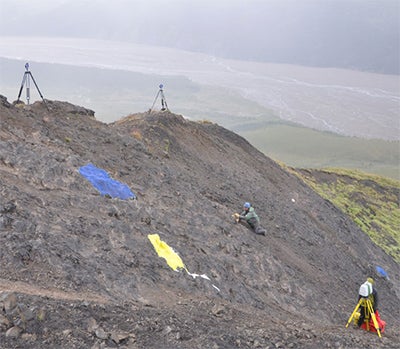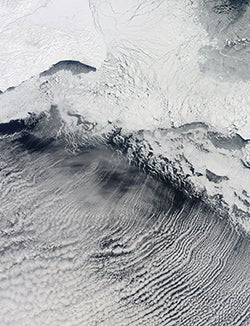Making research data more traceable
Pilot project to put relevant projects, collaborators, data at researchers’ fingertips
Sep 3, 2014 - by Staff
Sep 3, 2014 - by Staff
September 3, 2014 | As observing instruments and computer modeling become increasingly refined, the amount of data generated by field studies has grown tremendously. Storing and archiving the data is a challenge in itself, but scientists also need the data to be easily accessible and connected to other relevant resources.

Researchers use terrestrial laser scanning technology to analyze a dinosaur track site in Denali National Park and Preserve. Geophysical data from ground-based imaging coordinated by UNAVCO is being incorporated in a two-year EarthCube initiative. (Image courtesy UNAVCO and the Perot Museum of Nature and Science.)
To help address this issue, UCAR is launching a project with two partners—Cornell University and UNAVCO—that aims to connect the dots among field experiments, research teams, datasets, research instruments, and published findings.
The two-year project, titled "Enabling Scientific Collaboration and Discovery through Semantic Connections," is funded by the National Science Foundation’s EarthCube initiative, which supports transformative approaches to data management across the geosciences.
The project will demonstrate the benefits of a linked open data tool, known as VIVO, for managing scientific information and data. Developed by Cornell University Library in collaboration with a number of partners, VIVO is being used by over 100 organizations to create authoritative research profiles for faculty and staff as well as to link to their published studies and other relevant research. Other organizations, such as the Laboratory for Atmospheric and Space Physics at the University of Colorado Boulder, are extending VIVO to manage information related to scientific projects and research instruments.

Cold air pouring over the Bering Sea from the south coast of Alaska on April 7, 2013, formed these cloud streets, associated with parallel cylinders of spinning air. The Bering Sea Project is studying the potential effects of climate change on marine ecosystems across the eastern part of the sea. Observations from the project are informing a two-year study of data management. (Image courtesy NASA Earth Observatory.)
The project aims to adapt VIVO so it can be applied to large-scale field experiments involving many investigators from a wide range of institutions. This would create a network of information linking field experiments with particular datasets, authors, publications, and even research tools that result from or are associated with each experiment.
"Someone coming from the outside would be able to find a particular paper that emerged from a field experiment and very quickly track down datasets, instruments, researchers, and so on," said Matthew Mayernik, an expert on research data services in the NCAR/UCAR Library who is the principal investigator on the project. "This is really about increasing the traceability of research and making it easier for people to find, assess, and use data."
To demonstrate the effectiveness of the approach, Mayernik and his colleagues will use VIVO for data from two sources: a recent NSF-supported interdisciplinary field program whose data archive is hosted by NCAR’s Earth Observing Laboratory (the Bering Sea Project), and a set of diverse research projects informed by geodetic tools, such as GPS networks and ground-based imaging, that are operated and maintained by UNAVCO.
If successful, Mayernik said such an approach would be expanded to other field experiments, including their data sets, researchers, publications, and research resources.
|
Writer Collaborating institutions Funder |
|